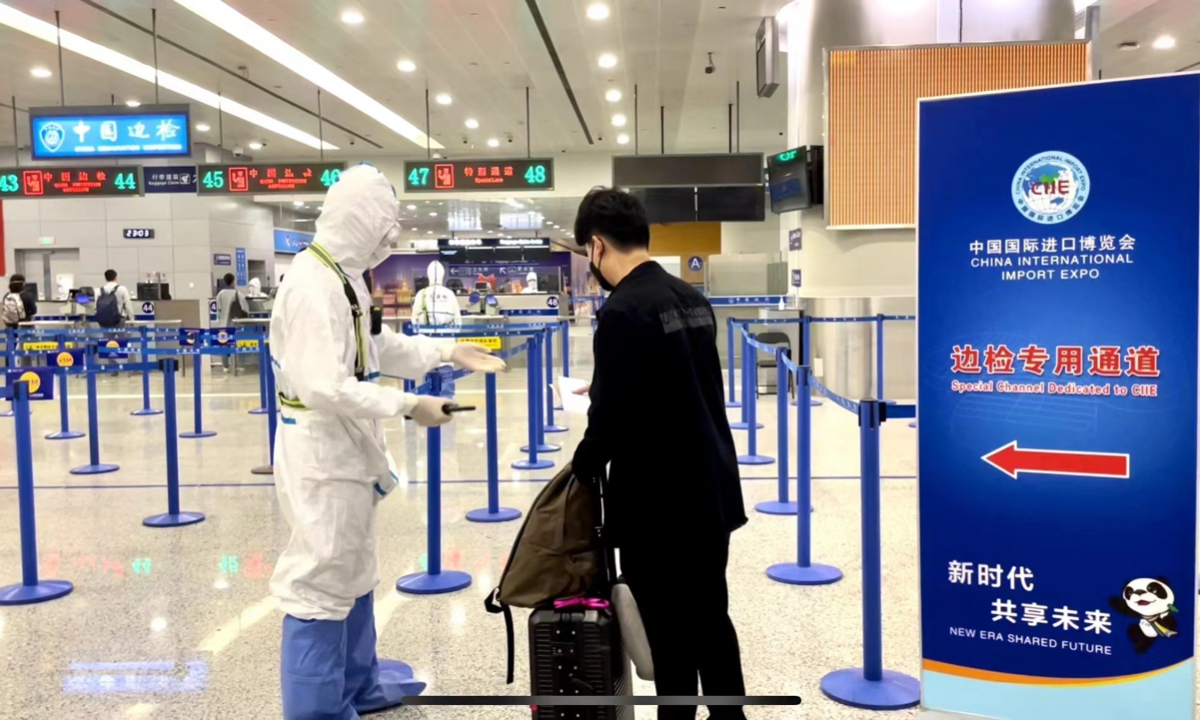
A police officer guides a passenger through entry formalities Photo: Courtesy of the Shanghai airport border inspection station
China ends COVID flight suspensions on Friday, immediately triggering a spike in searches for international flights to their highest level in a year, reflecting massive pent up demand.
Chinese health authorities said on Friday that overseas inbound flights to China will no longer be cancelled upon detecting positive cases on board, part of
a range of 20 measures released by the Joint Prevention and Control Mechanism of the State Council.
China also trimmed quarantine requirements for close contacts of confirmed cases from seven days of centralized quarantine and three days health observation at home to five days of quarantine and three days of observation, authorities confirmed.
The current requirement for two negative nucleic acid test certificates administered within 48 hours before boarding a China bound flight will now be reduced to a single test, according to the statement.
Following China's latest COVID-19 policy announcement, search traffic for international air tickets on travel platform qunar.com soared past its highest level in 12 months. As of 14:00, real-time search volume on the platform had tripled from the same period the day before, and showed no sign of abating.
The shortening of the quarantine time for arrivals to China means that the capacity of quarantine hotels has been enhanced, laying the foundation for an increase in the number of inbound flights in the future, Lan Xiang, president of the big data research institute under qunar.com told the Global Times on Friday.
Fliggy data showed that one hour after the policy was announced, search traffic for international air tickets on the platform increased threefold compared with the day before.
"The suspension of the circuit breaker policy is a welcome move," Xie Xingquan, Regional Vice President of North Asia from the International Air Transport Association, told the Global Times on Friday.
We hope that the Chinese government will have the confidence to remove quarantine and the need for COVID testing for arrivals, he added.
Doing so will also help to restore the hub status of key airports in China, including Beijing, Guangzhou and Shanghai, he said.
Industry information provider VariFlight predicted that the flying capacity of inbound routes by the end of November is expected to increase by more than 25 percent month-on-month and 300 percent higher than the low point of the year in May.
"I believe that after China implements these measures, it will improve cross-border travel and make it easier for relevant business people to invest and start businesses in China," said Zhao Lijian, a Foreign Ministry spokesperson.
Local capital markets reacted to the news with a big rally on Friday. Trading on the Shanghai and Shenzhen stock exchanges exceeded one trillion yuan ($140 billion), up by nearly 300 billion yuan from the previous day's trading.
The Shanghai Composite Index had strengthened by 2.16 percent as of 2:20 pm, regaining its 3,100-point plateau. The Shenzhen Component Index edged up 2.65 percent, while the ChiNext Index was up 2.76 percent. Real estate, healthcare and tourism shares led the rally.
In addition, the exchange rate of both onshore and offshore yuan strengthened more than 1,500 points to 7.10.
China is taking measures to facilitate international travel for key personnel exchanges.
In October, China's top economic planner, the National Development and Reform Commission, along with five other ministries, issued 15 measures including facilitating international travel for key personnel and allowing foreign companies to raise funds on China's stock markets.
China is likely to see a doubling in the number of international flights as the new flight season approaches, the Civil Aviation Administration of China (CAAC) said in October, forecasting that inbound and outbound flights are likely to reach 420 services per week during the coming season, which runs from October 30 to March 25 of 2023.
A number of airlines have announced resumption and increase in the number of international routes for the winter and spring season. China Southern Airlines said it will resume weekly international flights between Guangzhou and New York on December 1, its third service to North America, following flights from Guangzhou to Los Angeles and Toronto.
To control imported cases of the coronavirus, the CAAC introduced the "circuit breaker" and "Five One" mechanisms in 2020, which allowed Chinese carriers to operate only one outbound flight per week on one route to any country, and foreign airlines to operate just one flight a week into China.




